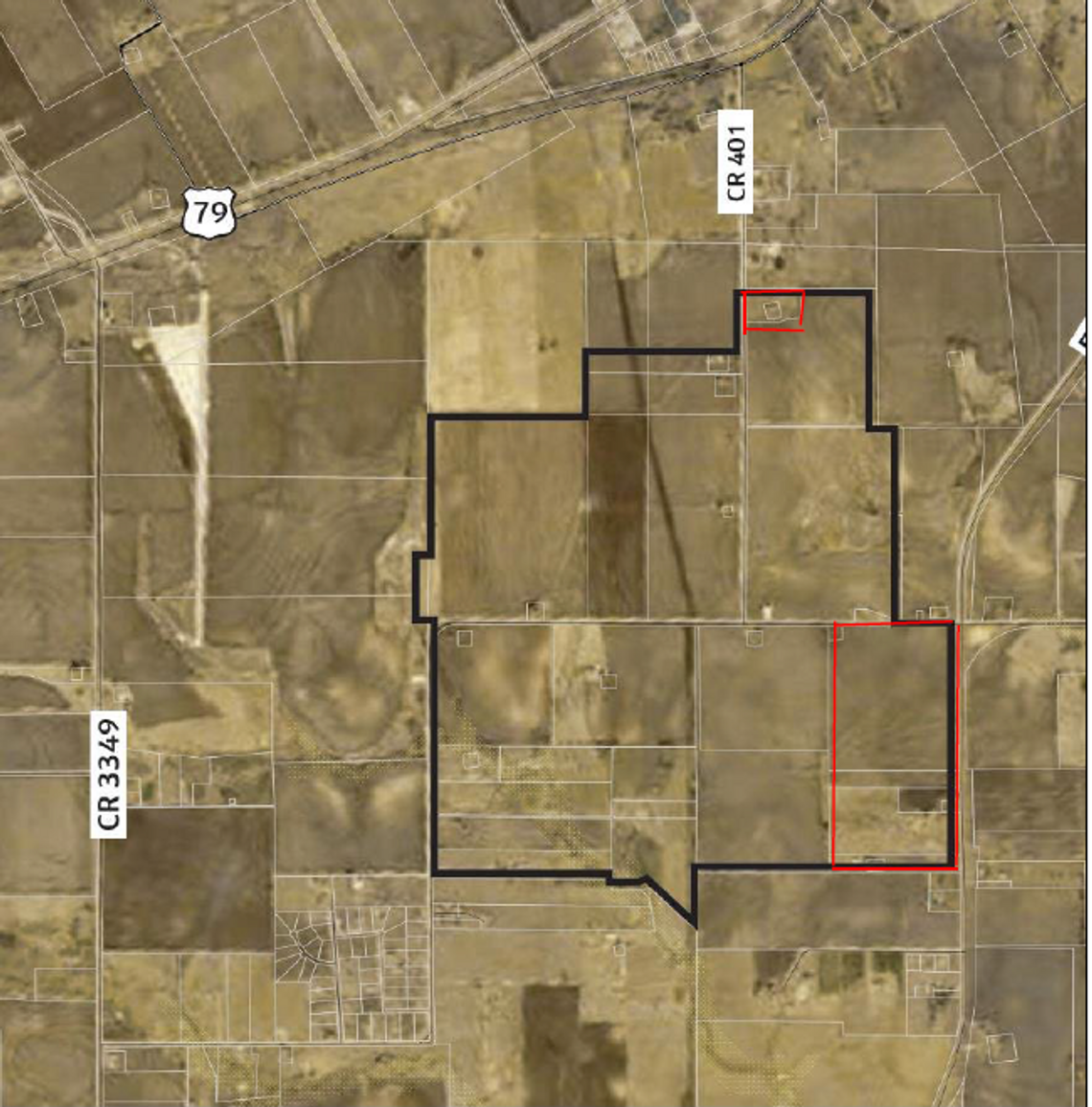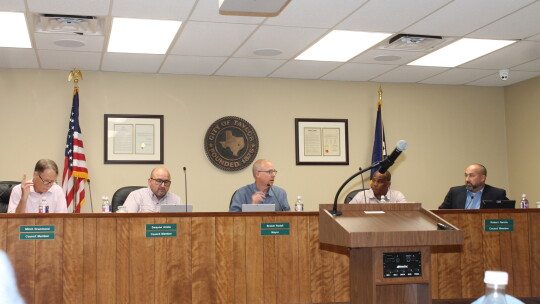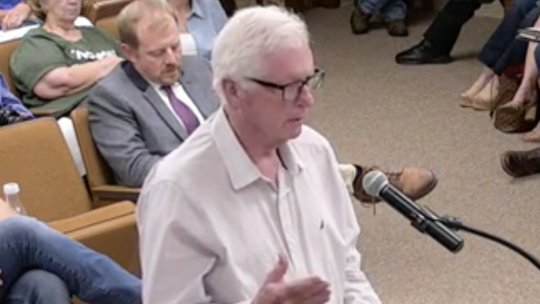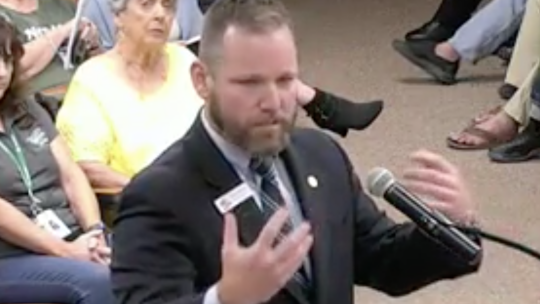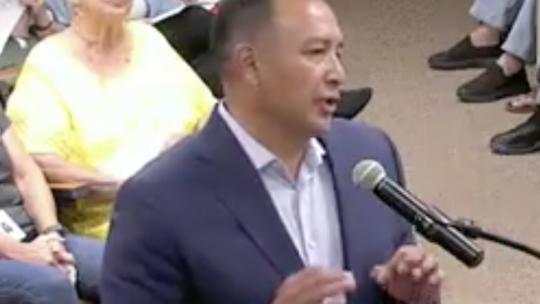Split decisions from Taylor leaders went favorably for agreements, ordinances and potentially future tax abatements involving more land for a local Samsung Austin Semiconductor plant in construction.
Agenda actions taken
On July 14, the City Council voted 3-2 on an ordinance to designate Reinvestment Zone No. 9, with council members Mitch Drummond and Dwayne Ariola voting opposed and council members Brandt Rydell, Robert Garcia and Gerald Anderson voting in favor.
The council then voted 4-1, with Ariola opposed, to:
• authorize the mayor to execute two new agreements. One agreement is a Chapter 380 agreement to allow for incentive payments from use tax generated by Samsung on their properties. The other agreement is a project donation agreement with Samsung to donate and escrow all costs associated with the installation of water and sewer utilities to their site. Amendments to existing chapter 212 and 311 agreements as well as a development review reimbursement agreement were approved;
• authorize an economic development performance agreement between the Taylor Economic Development Corporation (EDC) and Samsung Austin Semiconductor, LLC; and
• adopt an ordinance to amend and expand the boundaries of Tax Increment Reinvestment Zone No. Two.
The items included a public hearing, specifically in regards to expanding the boundaries of Reinvestment Zone No. Two, that saw no public input. However, during the citizen communications portion of the meeting, Jackie Krueger spent part of her time to discuss Samsung and for people she says did not believe it does any good to go and speak at a council meeting.
“The Samsung ship has sailed, but you need to work with the citizens and listen to what they’re saying. Hear them what they’re asking,” said Krueger. “I’m asking the council to listen to the constituents and not the forces that push you to vote one way or another or just to appease somebody else.”
Former mayor Jesse Ancira was hired by Samsung to be a consultant in February. He remarked on Krueger’s comments based on what he saw throughout the negotiation process.
“In all of the conversations that we had, the city’s posture was always, ‘Here’s what we can do, here’s what we can give but it has to be in the taxpayer’s interest,’” said Ancira. “I want to say that that they did a great job of always saying this is in the taxpayer’s interest, so I want to make sure everybody knows that.”
The meeting including an executive session of approximately one hour on the item regarding the Chapter 380 and related agreements and amendments. A brief special called meeting immediately followed the regular meeting on Tax Increment Reinvestment Zone No. Two.
Expansion
Thursday’s discussion centered around more parcels of land for Samsung and the expansion of tax reinvestment zones No. 2 and 9, which are effectively the same geographic zone.
“There are two zones that cover the Samsung property, and we had to do this in order for ad valorem and personal property purposes,” said City Manager Brian LaBorde, “but there’s two zones that basically overlay one another.”
Zone No. 9, also called Technology Expansion Zone and replaces Zone No. 8, deals with personal property. No. 2 is for real property, which is defined as land and buildings.
A public hearing and first reading of the ordinance to expand No. 9 was April 14. The second reading and approval was part of Thursday’s consent agenda before being pulled by Ariola for further consideration. A public hearing and two readings for No. 2’s ordinance were also Thursday.
“Additional properties were added to this, and they came and they were closed prior to when the announcement happened,” said La Borde while alluding to the November 2021 press conference that made Samsung’s intention to build in Taylor official. “I guess with the excitement and the wanting of the announcement and all that, the closing of these last remaining properties didn’t get done in time, but they were always intended for the zone.”
On July 7, Samsung requested existing tax abatements be extended to the new zones.
“(Currently,) no abatement is extended or any of the existing abatements are extended to these new properties. We would still have to come back to council and take that up,” said LaBorde. “There has to be an additional 30 days by statutory requirements to come back for that.”
A council meeting to discuss abatements is scheduled for Aug. 25.
Chapter 380 & more
The new Chapter 380 agreement was described by LaBorde as a revenue sharing agreement.
“It has identified a new source of revenue to help that all parties can share on, and this is to tie it to use tax,” said La Borde. “It’s when you order a product and where it’s going to be used at the end of the day at the business, so this company has to go outside and order, but they bring it in. It’s new money that coming into the city of Taylor. It’s not being spent out of the pockets of anyone here, … but that just doesn’t happen just haphazardly. Someone has to make sure that those contracts are in place and to corral that, and so you’ll see that everyone is sharing in it to help with this effort.”
Ariola indicated that the agreements, potential revenue stream and previously discussed abatements were not “new” to him.
“In my opinion, these agreements that we’re agreeing to with these tax abatements and all these things in here were, in my opinion, briefed to council prior to November that this was going to happen, so this is nothing new in my opinion. This use tax was discussed,” said Ariola, “so please stop approaching me and trying to tell me that this is brand new, found money because I knew this money existed. I knew the use tax existed.”
He acknowledged being onboard with Samsung joining the community in general.
“I want to reemphasize that this decision in November was unanimous, and I want to still say it’s unanimous for Samsung coming here,” said Ariola. “It was the worst kept secret for 11 months, and it was tough negotiations back in executive session. Lots of back and forth.”
However, Ariola expressed concern at potential impact to taxpayers, particularly with property taxes.
“I welcome Samsung, but it’s a two-way street, a two-way partnership in my opinion and we keep being asked to give and give and give,” said Ariola. “I’m tired of giving of the constituents’ tax money, and I know the potential. I get it. I know you want to grow. You didn’t buy 1,200-1,400 acres to stop growing. I get it, but the agreements were the agreements, whether they were verbal, gentlemen’s handshake or whatever. The things being agreed to tonight, in my opinion, we were briefed was already going to happen.
“The formula has never changed. We were briefed this was the formula that was coming,” he added. “It wasn’t in writing. Shame on our attorneys for missing it. Shame on our attorneys for missing it. Did a great job. This is the one thing that you missed.”
Councilmember Robert Garcia noted although property values might rise, effects of the Samsung plant might allow the city to lower its tax rate in the future. He also reiterated the usage of use tax.
“This is not coming out of the taxpayer money. You’re not fronting the money. You’re not giving the money up,” said Garcia. “This is coming from the use tax, so it’s just revenue sharing, so it’s not costing the taxpayer any money.”
Ariola also had infrastructure concerns that could be billed to the city. Councilmember Mitch Drummond reflected back on the revenue stream.
“Through all this, the taxpayers have not paid anything for bringing Samsung here. This is all potential revenue that we’re using to do this, to pay for this infrastructure,” said Drummond. “Yes, it’s revenue we’re giving up, but it’s an investment and it’s going to be good for the city and good for Williamson County.”
Garcia also believed benefits to the community and local school district, which gained internships amid Samsung agreements, outweighed Thursday’s discussion.
“It’s not about today’s Taylor,” said Garcia. “It’s about the future of Taylor.”
EDC
The council also approved by majority a performance agreement between Taylor EDC and Samsung.
“The EDC was approached to participate in proportion to the revenues that the EDC receives in the form of sales and use taxes,” said Mark Thomas, Taylor EDC president and CEO. “These are future dollars that are being generated by the project that will then be reinvested back into the project so that it will move forward.”
The performance agreement reportedly has similar mechanics to a Chapter 380 agreement and should reimburse sales or use taxes back to the project for qualifying expenditures.
Donation agreement
The project donation agreement between the city and Samsung donates and escrows all costs associated with the installation of water and sewer utilities to their site.
“We had escrow agreements that Samsung was contributing to help pay for this infrastructure. Now there is an agreement, there’s a document where it’s all contained. It’s consolidated. It’s there to see all of the phases, all of the costs, how it’s paid for,” said LaBorde. “It makes it easy to go to and point to. It doesn’t have separate documents that we just keep getting escrows for for each phase, so it consolidates it into one document that we have for the donation involving infrastructure.”
Amendments
The three authorized amendments included the original Chapter 311 agreement and a development reimbursement review agreement between the city and Samsung.
“(The development reimbursement review agreement) is to pay us back because we had to have money fronted to help pay for third-party costs for inspections and for plant review,” said LaBorde.
The third amendment was to a Chapter 212 development agreement, which LaBorde said effectively sets out some land entitlements on what a company can do for water, sewer, streets, drainage and land uses.
“The addendums that were really identified in there to clean up were third parties because they were coming on the scene, and so we wanted to make we delineated that the agreements here reflect with Samsung and not with the third parties,” said LaBorde. “Nonetheless, these third parties and the expediency of them to be ready to tie them to Samsung was paramount, so we wanted to make sure those third parties were there and to help with that because it’s a partnership. We want everyone to succeed.”
For the full aforementioned agreements, amendments and ordinances, view or download the agenda packets from Thursday’s meetings here and here.
To view the full meeting, visit http://taylortx.swagit.com/play/07152022-587.
DEFINITIONS
Real property
In short, real property is land and buildings. For details, see Section 1.04 of General Provision of Property Tax Code at https://statutes.capitol.texas.gov/Docs/TX/htm/TX.1.htm.
Personal property
In short, personal property is a wide variety of belongings such as furniture, heirlooms, clothes, purchased food, firearms, vehicles, pets and other items.
For details, see Section 42.002 of Property Code at https://statutes.capitol.texas.gov/Docs/PR/htm/PR.42.htm#42.002.
Escrow
This is a legal concept describing a financial agreement whereby an asset or money is held by a third party on behalf of two other parties that are in the process of completing a transaction. Money, securities, funds, and other assets can all be held in escrow.
Ad valorem taxes
These are more commonly known as property taxes. They are affected by both ad valorem tax rates and property values.
Use tax
This is a nonrecurring tax that is complementary to sales tax and is imposed on the storage, use or other consumption of tangible personal property or a taxable service in Texas. Texas sellers are required to collect and remit sales and use tax to the Comptroller’s office on their sales of taxable items or obtain a resale or exemption certificate in lieu of collecting the tax.
A Texas purchaser owes state and local use tax if they buy taxable goods and services that are stored, used or consumed in Texas from a seller who does not charge Texas sales tax. If the seller does not have a permit or fails to charge sales and use tax, the purchaser must pay the use tax directly to our office unless an exemption applies.
Tax abatement
A tax abatement is a local agreement between a taxpayer (such as Samsung Austin Semiconductor) and a taxing unit (such as Taylor’s municipal government) that exempts all or part of the increase in the value of the real property and/or tangible personal property from taxation for a period not to exceed 10 years. Tax abatements are an economic development tool available to cities, counties and special districts to attract new industries and to encourage the retention and development of existing businesses through property tax exemptions or reductions. School districts may not enter into abatement agreements.
Chapter 311
Tax Code Chapter 311 governs tax increment financing (TIF).
Chapter 212
Pursuant to Local Government Code, after a public hearing, the governing body of a municipality may adopt rules governing plats and subdivisions of land within the municipality's jurisdiction to promote the health, safety, morals or general welfare of the municipality and the safe, orderly and healthful development of the municipality.
Chapter 380
Chapter 380 of Texas Local Government Code authorizes municipalities to offer incentives designed to promote economic development such as commercial and retail projects. Specifically, it provides for offering loans and grants of city funds or services at little or no cost to promote state and local economic development and to stimulate business and commercial activity.
In order to provide a grant or loan, a city must establish a program to implement the incentives. Before proceeding, cities must review their city charters or local policies that may restrict a city's ability provide a loan or grant.
TIF
Tax increment financing (TIF) is a tool that incentivizes economic development. It is a method local governments can use to pay for improvements that will draw private investment to an area. Tax increment financing isn’t a new tax. Instead, it redirects some of the ad valorem tax from property (i.e. property taxes) in a geographic area designated as a Tax Increment Reinvestment Zone (TIRZ) to pay for improvements in the zone.
A TIF project jumpstarts development so it can start generating additional tax revenue for the local government. The local governments that participate in a TIF project make an up-front commitment to creating public improvements within the zone. These improvements encourage private investment in the zone, such as new business growth, that increases property values and generates new tax revenues.
TIRZ
A Tax Increment Reinvestment Zone project jumpstarts development to get things moving a bit faster and, ultimately, to generate new tax revenue. The benefits of a TIRZ include:
• builds needed public infrastructure in areas lacking adequate development to attract businesses;
• encourages development, thereby increasing property values and long-term property tax collections; and
• reduces the cost of private development by providing reimbursement for eligible public improvements.
Sources: Texas Constitution and Statutes, https://statutes.capitol.texas.gov; Texas Comptroller of Public Accounts, https://comptroller.texas.gov; Investopedia, https://www.investopedia.com.

